Improving Opportunities by Building Solar Food Dryers In Nicaragua

Ralph Bucca, an Agro-Processing Specialist with several volunteer assignments with the Farmer to Farmer Program in the past, was in Nicaragua this January doing what he does best: assisting and training small producers in low-technology and hands-on solutions that inexpensively improve food processing and, consequently, farmers’ livelihoods. For approximately two weeks, Mr. Bucca worked with Nicaraguan host organizations and conducted technical workshops on the construction, use and management of solar food dryers, for the purpose of food preservation and value added products. The tasks were fulfilling not only for Mr. Bucca but also for those local producers, many of them women, who were assisted. As he remarked while he was helping building these solar ovens to a group of eight women in Esteli, Nicaragua: “[these] women might not have ever used a saw, hammer, measuring tape, staple gun or screw driver… but they all seem to have a good time and are proud when it is done .“ ...



